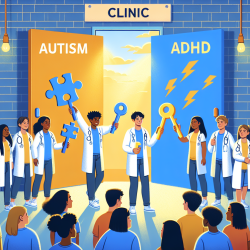Introduction
In the realm of mental health, autistic youth and those with ADHD face unique challenges that often require specialized approaches in psychotherapy. Recent research published in the Journal of Autism and Developmental Disorders highlights the critical need for clinicians to enhance their knowledge and confidence when working with these populations. The study, titled Clinician Knowledge, Confidence, and Treatment Practices in Their Provision of Psychotherapy to Autistic Youth and Youth with ADHD, sheds light on the current gaps and opportunities for improvement in therapeutic practices.
Understanding the Research
The study surveyed 557 clinicians to assess their knowledge, confidence, and treatment practices when providing psychotherapy to autistic youth and youth with ADHD. The findings revealed that while clinicians generally use similar interventions for both groups, they feel significantly less knowledgeable and confident when supporting autistic clients compared to those with ADHD.
This disparity underscores the need for targeted training and resources to enhance clinician capabilities in delivering effective mental health care to autistic youth. By addressing these gaps, clinicians can better tailor their interventions to meet the specific needs of their clients, ultimately improving outcomes.
Key Findings and Recommendations
- Knowledge and Confidence: Clinicians reported lower levels of knowledge and confidence when treating autistic clients. This highlights the importance of specialized training programs that focus on the nuances of autism and its impact on mental health.
- Treatment Adaptations: The study found that clinicians often use similar adaptations for both autistic youth and those with ADHD, such as providing structure and predictability and incorporating special interests. However, the perceived helpfulness of these adaptations was generally rated lower for autistic clients, suggesting a need for further refinement and personalization of strategies.
- Barriers to Care: Despite employing evidence-based practices, clinicians face barriers in effectively supporting autistic youth. These include challenges in establishing rapport and delivering interventions with the same intensity as in research settings. Addressing these barriers requires a comprehensive approach that includes policy changes and increased access to resources.
Moving Forward
For practitioners looking to improve their skills, the research offers valuable insights into the areas that require attention. By investing in professional development and seeking out additional resources, clinicians can enhance their ability to provide effective psychotherapy to autistic youth and those with ADHD.
Moreover, engaging in further research and staying informed about the latest developments in mental health care for neurodevelopmental conditions can empower clinicians to make data-driven decisions that lead to better outcomes for their clients.
Conclusion
As we strive to create great outcomes for children, it is imperative that we equip clinicians with the tools and knowledge they need to succeed. By addressing the gaps identified in this research, we can foster a more inclusive and effective mental health care system for all youth.
To read the original research paper, please follow this link: Clinician Knowledge, Confidence, and Treatment Practices in Their Provision of Psychotherapy to Autistic Youth and Youth with ADHD.










